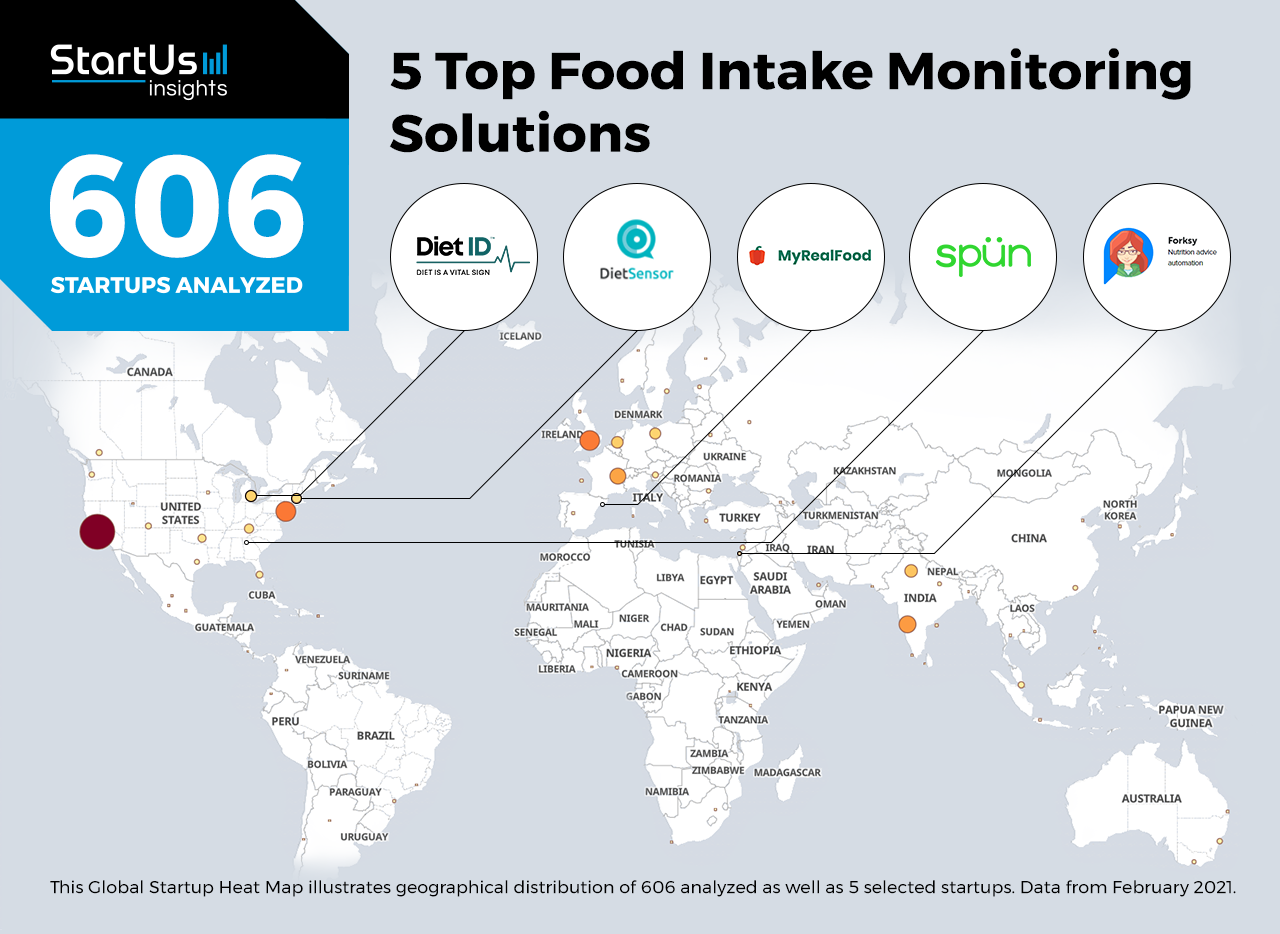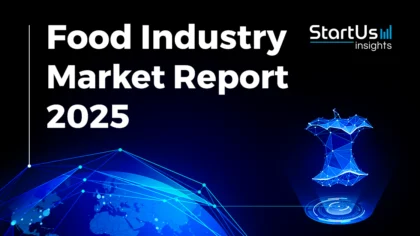Staying ahead of the technology curve means strengthening your competitive advantage. That is why we give you data-driven innovation insights into the healthcare sector. This time, you get to discover 5 hand-picked startups developing food intake monitoring solutions.
Global Startup Heat Map: 5 Top Food Intake Monitoring Solutions
The 5 healthcare startups you will explore below are chosen based on our data-driven startup scouting approach, taking into account factors such as location, founding year, and relevance of technology, among others. This analysis is based on the Big Data & Artificial Intelligence (AI)-powered StartUs Insights Discovery Platform, covering over 1.3 million startups & scaleups globally.
The Global Startup Heat Map below highlights the 5 healthcare startups & scaleups our Innovation Researchers curated for this report. Moreover, you get insights into regions that observe a high startup activity and the global geographic distribution of the 606 companies we analyzed for this specific topic.
Forksy AI creates a Conversational Food Diary
Conversational artificial intelligence platforms such as chatbots have started to gain popularity in the nutrition and health industry. Personalized diet plans, nutrition tracking, setting water intake reminders and more can be done using conversational AI platforms. The ease of use and text or voice-based data sharing draws many users towards these solutions, mostly available as mobile applications (apps). Natural language processing (NLP) and decoding the nutritive value of mentioned meals from a library of food data is the prime functionality of a chatbot tracking nutrition.
Israel-based Forksy is an artificial intelligence-based conversational platform that understands food-related conversations. The platform extracts facts from a message such as a food’s name, serving size, meal times and classifies food based on 500 different categories. For example, eating behavior management is an interesting feature, which provides instant feedback through analysis. The bot responds to consumed foods based on user goals, food intolerances, and other personal parameters and conditions. Other features include AI-powered diet plan customization, recipe recommendation, and more. Additionally, statistical information on food and calorie consumption are presented as graphical visualizations and recommends personalized lifestyle advice.
Spun builds a Nutrition Tracking Utensil
The most crucial factor in food intake tracking is the quantity of food ingested. However, few people measure their ingredients to stay within recommended levels because conventional methods, including using a kitchen scale, are time-consuming therefore too much work to stick to for a longer period of time. Technology enables us to track our food intake in an automated way through smart analysis of multiple parameters. For example, motion sensors and image recognition can aid in the development of smart utensils that record the weight of food provide valuable insights on every meal.
Spun is a startup from the United States which develops intelligent utensils, capable of measuring food consumption and calorific value. The startup creates battery-powered utensils (Spoon & Fork), which are connected to their proprietary mobile app. The food intake tracking is initiated when the customer takes a picture of their meal in the Spun app, and eats the meal using the Spun utensil. Spun utensils measure the exact weight of the food going into a user’s mouth and convert the weight to calorie and nutrition information in real-time using gesture recognition to calculate the number of bites and the time taken between each bite.
Diet Sensor scans Food
The advancement in applications of sensors and scanners are contributing to the greater good in the healthcare industry in terms of diagnosis and visualizing conditions such as a fracture. Further, it is possible to scan foods, meals, or drinks to quantify their nutritive value using spectroscopy. Spectroscopy analyzes substances based on how their molecules interact with light. Thus, if we can analyze food molecules by how they vibrate in a unique manner when it interacts with light, the components of the food – carbohydrates, proteins, minerals, etc. – can be quantified.
US-based startup DietSensor builds sensors that automate nutrient counting and enables accurate diet tracking for people with obesity or other food-related chronic diseases. A smart scale that contains the SCiO food scanner weighs food portions and sends the information directly to a user’s mobile application for accurate food tracking. The pocket-size SCiO scanner scans the meal for accurate carbohydrate, protein, and lipid amounts. It uses near-infrared spectroscopy to determine the chemical makeup of food and drink. The scanner only reads homogeneous food (such as cheese, crackers, bread) and is not able to pick up all of the ingredients in a sandwich, however, the app allows users to input more complex meals manually. There is also a feature for dictating a meal and recording the calorific value for tracking the nutrition levels. This app helps people with diabetes, hypertension, and high cholesterol to maintain their diet and manage chronic health conditions.
Diet ID assesses Diets based on Images
Non-reliable and poor food monitoring arises from underreporting, which might be due to forgetfulness or the difficulty of accurately estimating portions. With the widespread use of mobile phones with cameras, image-based tools are increasing with many applications across sectors. Images can give dietitians a more accurate sense of a client’s portion sizes. Image-assisted or image-based dietary assessments (IBDAs) refer to the use of food images as the primary dietary record and have emerged as key methods for evaluating habitual dietary intake in recent times.
Diet ID, a startup from the United States, utilizes a novel approach to dietary assessment and tracking – via the image pattern recognition of meals. The solution Diet Quality Photo Navigation (DQPN) showcases image sets of different food and the user chooses the image that most resembles other own food. The results aid to create a baseline dietary pattern within minutes. Diet ID’s nutrition team then analyzes the data using the Nutrition Data System for Research (NDSR) software in which the calculation of nutrients and food groupings provides data for diet quality scoring. The tool also evaluates data that users input – such as dietary preferences, goals, height and weight, age and gender, etc. – using proprietary algorithms to generate a personalized summary of their diet. Dieticians and patients can then utilize Diet ID to manage diabetes prevention programs, cardiac rehab, or chronic care management, for conducting a nutrition assessment and developing a personalized diet plan.
My Real Food develops a Smart Food Tracker App
Maintenance of grocery and kitchen inventory is strenuous as it requires constant updates and changes. For example, while food safety monitoring and expiration reminders ensure safer nutrition and also contribute to less food waste, careless purchases of food containing allergic ingredients can even lead to hospitalization. Additionally, people often spend hours planning for cooking a meal with available groceries and still give up to order from a restaurant, letting fresh vegetables go to waste. Mobile applications are available for tracking one or multiple of these scenarios and come in very handy in everyday food handling.
Spanish startup My Real Food develops a mobile application with multiple features such as personalized recipes, calorie logs, food recalls, grocery tracking, food processing scanner, and more. When food is scanned, the algorithm takes the NOVA food classification system into account and classifies the food into three categories: real, processed, or ultra-processed. The meals’ and recipes’ calories can be logged instantly to the app, allowing users to customize their calorie and macronutrient intake goals. Additionally, the app provides a weekly meal plan, shopping list for groceries, and nutrient tracking to visualize complete diet planning and health goals.
Discover more Healthcare Startups
To keep you up-to-date on the latest technology and emerging solutions, we provide you with actionable innovation intelligence – quickly and exhaustively. You can download our free Healthcare Innovation Report and discover new business opportunities or save your time & let us look into your areas of interest. We provide you with an exhaustive overview of new startups, scaleups & emerging technologies that matter to you.


![Food and Beverage Industry: Top 10 Technology Trends [2025 & Beyond]](https://www.startus-insights.com/wp-content/uploads/2024/11/Food-and-Beverage-Industry-Trends-SharedImg-StartUs-Insights-noresize-420x236.webp)






